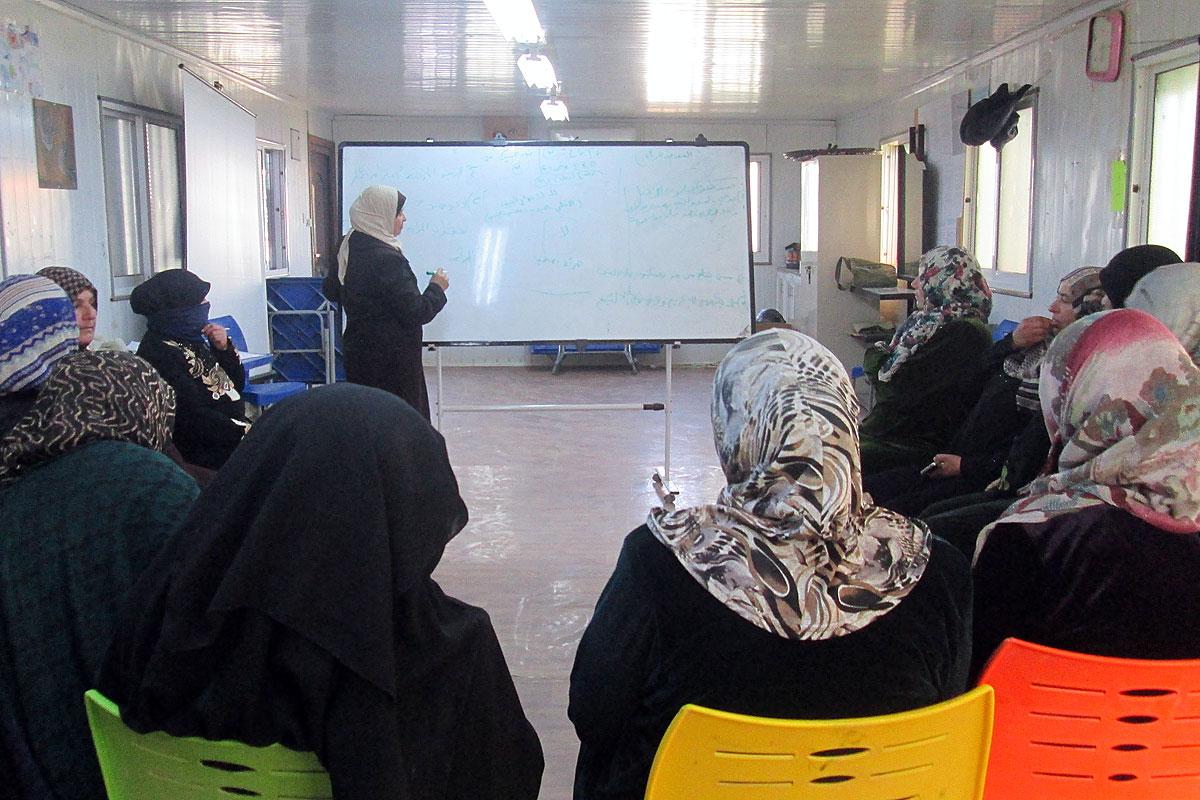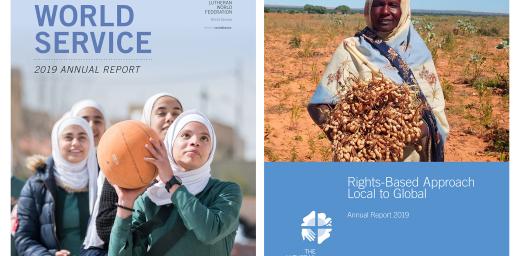A safe childhood for boys and girls

Wafeh shares her knowledge in the womenâs group. Photo: LWF/N. Boase
Women’s group in Jordan advocates against early marriage and child labor
(LWI) – In the eyes of her family and community, Wafeh should feel happy: Her daughter has already received two offers for marriage. As a mother of five girls, the 35-year-old woman is under pressure to see her daughters settled. She however, does not share the joy: The suitors are both adult men. Her daughter has just celebrated her 13th birthday.
Wafeh and her family are refugees from Da’ara, Syria. They fled the civil war and now live in Za’atari refugee camp, Jordan. With the war in its sixth year and no hope in sight for the displaced to return, many have exhausted their resources, and donations are sinking. Consequently to many refugee families, marrying off their daughters early and receiving a bride price on top of having one less family member to support has become a mechanism of survival.
“Violence against women, underage marriages, and child labor devastate the community,” Wafeh says. She is supported by a women’s group established by The Lutheran World Federation (LWF) in Jordan. Formed in October 2016, the group is part of a bigger project of the LWF Jordan office that provides vocational training and life skills to more than 800 Syrian and Jordanian women. By mixing refugees and local Jordanians in the training, the aim is to establish personal connections between the two groups, and to reduce tensions and prevent conflicts between the communities.
Participating in the women’s group has taught Wafeh ways to talk to her neighbors about early marriage, and encouraged her in her resolve, she says. “It is important to share the information and make sure others understand. I have started talking to my neighbors in order to bring awareness about early marriage. I tell them to not let their underage daughters get married.”
It is important to share the information and make sure others understand. I have started talking to my neighbors in order to bring awareness about early marriage. I tell them to not let their underage daughters get married.
Parenting skills
Girls however are not the only ones at risk. The economic challenges of life in a refugee camp compels many young people to look for work in order to help out their family financially. Again the households headed by women are particularly vulnerable. LWF offers cash assistance to vulnerable households to deter the need for child labor. Women like Wafeh advocate for education to boys and girls. “I am not allowing my children to work. I also encourage my friends not to allow their children to work but to let them go to school,” Wafeh says.
The women’s group not only advocates for the rights of children to education, but also serves as a support group for the questions of daily life. Wafeh says that the group of women with children of varying ages has taught her parenting skills for her own children. “I have learned how to raise my children without violence, and how to communicate with them in other ways.”
Having a safe designated space and time to share each other’s mistakes and learn from those mistakes has given Wafeh a “maternal nest of knowledge,” as she calls it.
Gender justice
The problem of inequality between men and women was a challenge in Syria and it persists in the camp, Wafeh says. She finds that these inequalities do not only manifest themselves in the many cases of sexual exploitation. To her, discrimination starts with the parents treating sons and daughters differently.
“Sometimes parents don’t view boys and girls to be equal,” she says. “For example, fathers will only give their inheritance to their sons and leave daughters with nothing.”
Wafeh has high hopes for her five daughters. She wants them to obtain a university education. She also has individual goals for herself -- to improve her computer and sewing skills, have a steady job and increase her knowledge. She sees the women’s group as a way to reach that goal: “I haven’t skipped even one session.”
LWF Jordan assists refugees from Syria accommodated in host communities and in Za’atari refugee camp through cash-based interventions, school and house rehabilitation, trainings and psychosocial support. Until last year, LWF had provided assistance to more than 200,000 refugees and vulnerable people in Jordan. In 2015 alone LWF supported 67,081 people.




